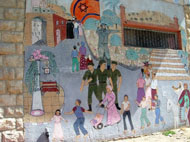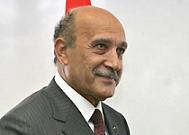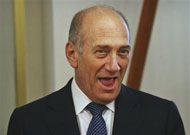On December 17, the highly anticipated day-long donor’s conference commenced in Paris. The conference, brainchild of Middle East envoy Tony Blair and attended by 70 countries and 20 organizations, aimed at providing a monetary basis to reform and develop the dire economic situation in Palestine as well as to set the conditions for the creation of a secure, stable and sustainable Palestinian state.
In the weeks preceding the conference, Palestinian President Mahmoud Abbas declared that Palestine required $5.6 billion until 2010 to remedy its current economic crisis and to lay the foundations for its future survival. The International Monetary Fund [IMF] concurred with this estimation and before the conference had even convened, Abbas had already been pledged substantial sums of money from the big donors.
The bar was set by US Secretary of State Condoleezza Rice, who penciled in a $555 million donation to Abbas just for 2008 [$150m for the West Bank government; $115m for humanitarian assistance and $290m for development projects]. Although a grand gesture which may demonstrate the role the US plans to take in rejuvenating Palestine, Israel receives this sum of money from the US every two months; none of the funds above are to be allocated to Gaza; in addition, $400 million of it must still be ratified by Congress.
The donations pledged [not guaranteed] in Paris far exceeded the expectations of President Abbas and Prime Minister Salam Fayyad. Palestine, over the next three years, will ostensibly receive approximately $7.4 billion from donor countries. In addition to the funds from the US for 2008, the European Union, according to External Relations Commissioner Benita Ferrero-Waldner, has signed up to $650 million for next year [similar levels expected in the years following]. Britain has agreed, in theory, to $500 million until 2010; Norway $420 million; Spain $360 million; France and Sweden $300 million and Germany $290 million. The Arab League has also promised $1.3 billion over the next three years.
Tony Blair stated that "what we pledge today will be indispensable to the creation of that [Palestinian] state", while French President Nicholas Sarkozy declared "what we must do now is work together before the end of 2008 for the creation of an independent, democratic, viable Palestinian state".
While both statements are true, although the donations will be “indispensable”, the true vision of the funds and the commitments involved must not be overlooked.
Donating the money is not even half the battle. The international community must not just “work together” before the end of 2008 for a Palestinian state as Sarkozy said but must ensure they work together indefinitely until the goal is attained and then even for longer after that. The implementation and allocation of these funds through the right avenues is the real test, where hard work and undeterred commitment is paramount.
At Paris, the international community should not simply sign their cheque books and pass them on to Abbas, sporting their selfless smiles of generosity, only to return home feeling as if they have performed a great deed and are therefore obligated no further. They have collectively, in effect, signed a life-long contract. Like any investment, the investor should proceed about executing their proposal as vigorously, devotedly and precisely as possible to obtain maximum profit – the profit in this case being an independent and sustainable Palestinian state.
As the World Bank report on “Investing in Palestinian Economic Reform and Development” has warned, the ramifications of international abandonment could prove even more damaging for an already deeply beleaguered economic situation in Palestine.
The World Bank has evaluated the state of Palestine’s economic health and concluded that it is too fragile a system to survive on its own.
Since the breakout of the Aqsa Intifada and the subsequent election of Hamas in 2006, which ceased all foreign donations to Palestine, the aspiring state has become almost completely dependent on aid with a lack of investment in public infrastructure and private enterprises. In 2006, Palestine’s per capita GDP was $1,130, a 40% decrease from the same statistic prior to the Aqsa Intifada. Unemployment in Gaza stands at 33% whereas in the West Bank it is 19%.
This state of affairs has not been entirely self-inflicted but has been exacerbated greatly by Israeli occupation. Palestine is entrenched and utterly at the mercy of its occupier. There are 541 checkpoints, 149 settlements and 100 settlement outposts with a population of 450,000; 38% of the West Bank is closed off to Palestinians and 95% of Palestine’s trade is with Israel.
The World Bank recommends a quid pro quo approach and has pinpointed prerequisites for success. “Embedded within the PRDP [Palestinian Reform and Development Plan] are a set of assumptions on the growth of the economy, the revival of the private sector income and employment, and the PA’s ability to endure the current crisis by meeting its financial needs. The realism of these assumptions is directly related to progress on the movement and access agenda, and equally importantly, on the commitment of donors to meet the financing gap over the three-year horizon of the PRDP”.
Prime Minister Fayyad has compared the scenario with a three-legged table. Even with transparency, reform and development standing strong, they will invariably fall unless Israel provides the final supporting feature. Israeli Foreign Minister Tzipi Livni, who was not a donor but present in Paris stated that Israel would “welcome the Palestinian reform plan as a serious effort to build the basis for a responsible Palestinian state that the Palestinian people so deserve and that peace so needs”. The question is whether the foreign minister's rhetoric will be supported by advancements made on the ground. Essentially the success of the PRDP is in the hands of Israel and the willingness of the international community to apply pressure on it.
Then there is Gaza, which comprises 40% of the Palestinian population. Currently, the coastal strip is under the control of Hamas and subsequently closed off to the outside world, suffering from incursions as well as sanctions on food, fuel and movement applied brutally without adherence to international law by an Israeli government that wishes to cripple them into submission. 95% of Gaza’s industrial operations have been suspended, turning Gaza into an area driven only by public sector salaries and humanitarian assistance.
The fear is that the projected allocation of donor funds in this three-year framework does not ensure a resolution in Gaza and has therefore been distributed accordingly. Prime Minister Fayyad stipulated that 70% of funds would go towards balancing the budget deficit, aiming to lower it from 28% of GDP to 17%. A percentage of the 70% would also be for ensuring the wage bill, fixing net lending and improving social welfare. The 30% remaining would be used as capacity building for future development. While donor countries have included Gaza into this financial equation, an actual amount has not been set nor a mechanism for which to allocate it. In addition, with the current Israeli blockade imposed on the Strip as a result of Hamas’ seizure, the donors have implied that immediate aid will be highly limited. Basically, this means the ball is back in Hamas’ court – relinquish Gaza if any donor assistance is to reach its people.
UN Secretary General Ban Ki-Moon seems to have been the only member in Paris to have voiced concern by highlighting that “with few exceptions, all manner of legitimate trade with Gaza has come to a standstill, with devastating effects on the economy and on family livelihoods." The Western donors have adopted a policy of extending a message to Hamas that the only thing standing in the way of them and equal treatment in this recovery process is their surrendering of Gaza. Hamas shows no sign of hesitation or regret, instead is comfortable in the assertion that they have the potential to hinder the smooth running of this Palestinian recuperation. The response from Gaza has been firm. Although they welcome any aid donation to the Palestinian people, Hamas spokesperson Sami Abu Zuhri denounced the Paris Conference, quoting their omission as a “declaration of war”. Meanwhile, the 1.4 million people in Gaza continue to be the sacrificial pawns in this deadlock.
There will be nothing for Hamas to disrupt if Israel doesn’t alleviate restrictions on movement. This point cannot be stressed enough. As the World Bank has advised, if the international community stays true to its pledges but fails in persuading Israel to lift movement and access restrictions, real growth will continue to be negative. However, if aid targets are not met, negative growth and poverty levels will increase dramatically. Palestinian fiscal and security reforms will not reverse economic decline on their own - the international community must act as the equalizer, must be prepared to fill in the gaps and must apply the pressure on Israel to comply. The private sector is especially critical as without it, “the PA will not be able to translate its reforms in the revenue collection mechanisms into additional funds, neither will it be able to cut spending without increasing poverty”.
Since 1993, the international community has provided the PA with nearly $10 billion in aid. Not all of this money can be accounted for with much of it caught up in bureaucracy and the corruption of Fatah officials because there was no coherent plan for deployment or execution. Some commentators prior to the conference emphasized “donor fatigue” in respect to Palestine. Why then was the international community so eager to pledge so much money? The answer lies in the man at the helm – Salam Fayyad. The prime minister and former IMF and World Bank employee is not only an excellent economist but a remarkably trusted individual amongst the international donors. Salam Fayyad has meticulously established a method of directing funds to the right areas, auditing their use and monitoring their implementation. However, to prevent these funds entering a “leaking bucket”, as Oxfam suggests, the international community must commit fully to the project. They must supply the funds they have promised; be prepared to go the distance required for success and most crucially, they must demand that Israel alleviates restrictions on movement and access in order to create an environment on the ground that enables these measures to be executed efficiently and effectively. Otherwise, this is yet another colossal waste of money.











